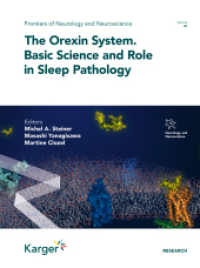- ホーム
- > 洋書
- > ドイツ書
- > Social Sciences, Jurisprudence & Economy
- > Politics, Society, Work
- > social science
Description
Today's quality of life in the Polish countryside is intertwined with residents' social capital resources. To describe the matter comprehensively and suggest potential trends, the authors examine in four chapters critical socioeconomic issues that have shaped selected dimensions of the rural quality of life in Poland: In addition to the description of Polish rural areas before and after accession to the European Union (1), the level and standards of living in the countryside identified in the study is presented (2). The social capital of the Polish rural population (3) and the changes in the quality of life in the Polish countryside from the perspective as perceived by local leaders are also described in detail (4). Dr hab. Wioletta Knapik is Associate Professor at the University of Agriculture in Kraków, Poland. Until 2004, she was a general manager in three large-format retail chains. She is a rural sociologist. Since 2019, she is a coordinator of the discipline of management science and quality. She is the founder and head of the Observatory of Development and Cultural Heritage, which has been operating since September 2021. She represents the University of Agriculture in the Cracow Congress Ambassadors Club. Her scientific activities focus on the study of social changes taking place in rural areas, innovation and entrepreneurship. Dr hab. Tomasz Maslyk is Associate Professor at the AGH University of Kraków, Poland. His research interests relate to social capital, generalized and institutional trust, civil society, and disability. Dr hab. Katarzyna Zajda is the Chair of the Department of Rural and Urban Studies and Sociology of Social Change and an Associate Professor at the Faculty of Economics and Sociology, University of Lódz, Poland. She is the winner of several national scientific awards, including a scholarship for outstanding young scientists awarded by the decision of the Minister of Science and Higher Education, as well as a scholarship from the Heinrich Böll Foundation. She specializes in rural sociology and focuses on social capital, social innovations, social problems, and migration to rural areas. Lukasz Trembaczowski, PhD, is an adjunct at the Institute of Sociology at the University of Silesia in Katowice, Poland. His research focuses on the sociology of work, economic sociology, and the social dimensions of just transition, particularly in coal-mining communities. He explores issues of trust, risk, and economic stratification in the context of economic and energy transformations. Lukasz Trembaczowski has acted as a scientific coordinator in the Just Transition Research Group at the University of Silesia, contributing to key reports such as Proposed Recommendations in the Area of Just Transition for the Ministry of Climate (2020) and Programme Frames for Integrated Just Transition Planning for the Institute of Environmental Protection - State Research Institute (2021).





